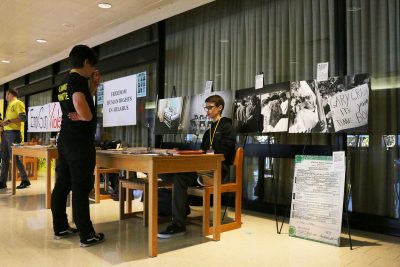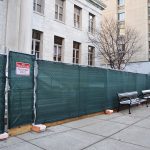
Hundreds of Amnesty International volunteers and activists traveled from all over the country Boston last weekend for the organization’s Northeast Regional Conference, which took place in Cambridge on Friday, then at Boston University on Saturday.
“The conference is a forum where we present human rights issues that Amnesty International is working on at a global and domestic level,” Cynthia Walsh, a senior organizer of AIUSA, said prior to Saturday’s event.
AIUSA’s current priority campaigns include ending gun violence in the United States and addressing the global refugee crisis, Walsh said. The organization will soon launch a brand new campaign for human rights defenders, she added.
Walsh said she hopes participants will use the information they glean from this conference to mobilize their communities to become part of a global human rights movement.
“Over the years, I’ve seen the successes of the cases we’ve worked on [our work] does result in effective action,” Walsh said. “For me, that’s why I care. That’s what makes me care, knowing it really does work.”
At the beginning of the day, Nikita Naidu, a senior at Guilderland High School in New York and a student activist coordinator for AIUSA, said she was most looking forward to the organization’s Write for Rights campaign, where participants write letters to advocate for human rights cases around the globe.
“I’m particularly interested in the Write for Rights case of this girl named Annie who has albinism,” Naidu said. “In Malawi, people believe that people who have albinism have magical powers, and they kidnap them for their organs. We’re calling on the president of Malawi to protect albino people in Malawi and grant them the rights that any human should have.”
The conference kicked off with remarks from keynote speaker Evan Mawarire, a Zimbabwean activist who was helped by the Write for Rights campaign.
Mawarire, who described himself as a husband, pastor and reluctant activist, founded the #ThisFlag social media campaign in Zimbabwe, which incited protests against the nation’s corrupt government.
At times, speaking in Metcalf Hall in the George Sherman Union, Mawarire became so emotional that he could not go on. Each time, the audience consoled him with warm applause.
“You may never meet the people that you fight for [as part of AIUSA], but I’m here to tell you that every day that you show up to do what you do so passionately is a day that people like me get a chance to be alive just one more day,” Mawarire told attendees. “Thank you so much for what you do for us.”
Melindy Dorcin, a senior at Trinity College, said she joined AIUSA her freshman year, and she loves the environment and activism prevalent at the conferences.
“Being in the sciences, you don’t get as much human rights exposure,” Dorcin, a biology major, said. “[AIUSA] felt like something I really wanted or needed for my entire college experience.”
After Mawarire’s address, conference participants can choose to attended dozens of morning workshops, topics of which range from death penalty to gun violence.
One of the workshops, “Activism is Not a Crime,” hosted in the College of Arts and Sciences, connected the story of the Dakota Access Pipeline protests to Berta Cáceres, a Honduran environmentalist murdered for her opposition of a dam that would displace indigenous families.
Zeke Johnson, managing director of AIUSA’s Individuals at Risk campaign, designed the “Activism is Not a Crime” workshop to emphasize the importance of human rights defenders as part of AIUSA’s upcoming campaign.
“People like Berta Cáceres who we saw in the workshop — she ended up giving her life to protect human rights,” Johnson said after the workshop. “What I really wanted to do was [to] talk about how we can all be human rights defenders and support each other’s human rights, to make sure that no other human rights defender ever pays the same price that Berta did.”
Aleaya McFarlan, a senior at Dover-Sherborn High School, said during the workshop that human rights organizations like AIUSA give her hope.
“When I’m in environments like this [conference], I can’t feel hopeless,” McFarlan said. “If anything, I feel more empowered to fight against injustices.”













